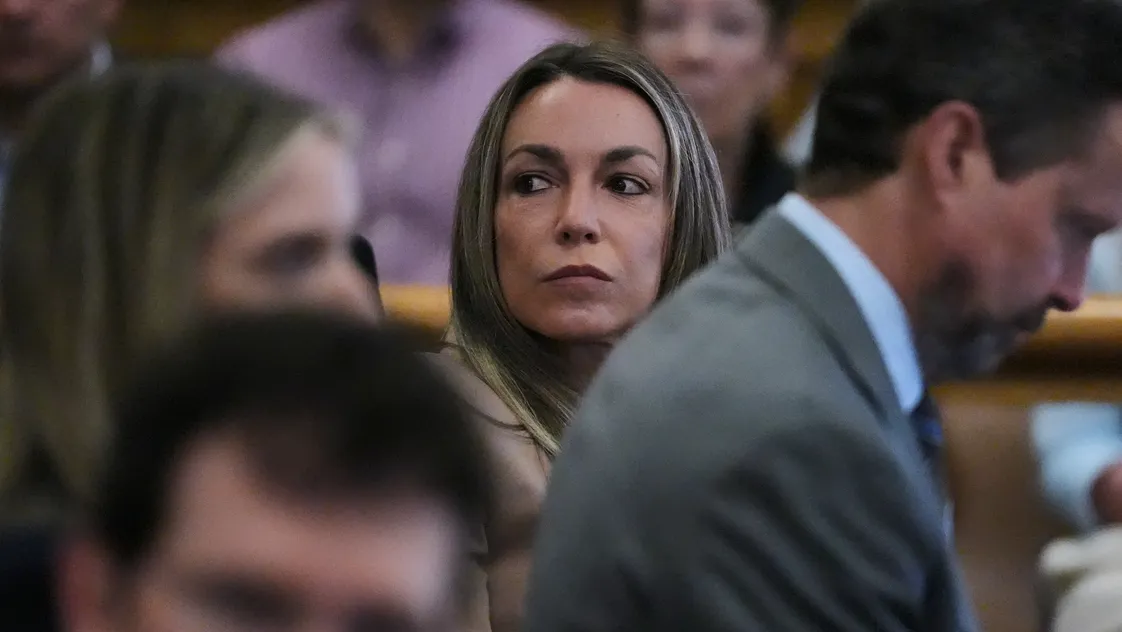What happened on Day 5 of Karen Read's murder retrial? Who testified? Recap
- Apr 28, 2025
- 5 min read
The retrial of Karen Read, a Massachusetts woman accused of killing her boyfriend, Boston police officer John O’Keefe, entered its second week with new expert testimony about where O'Keefe was the night before he died.
Read’s retrial comes after a jury in her first trial was unable to reach a unanimous verdict on the charges against her in July 2024. Prosecutors allege that Read, 45, deliberately hit O’Keefe with her SUV in a drunken rage and left him to die in the snow in January 2022. Her defense team has alleged that a group of Boston police officers beat O'Keefe to death and framed Read for murder.
Ian Whiffin, a digital intelligence expert, showed jurors cell phone data he said indicates that O'Keefe did not go inside the home of Boston cop, as the defense team has suggested, after he exited Read's car the night before he was found dead.
Judge Beverly Cannone adjourned the jury early to resolve an issue with two defense team witnesses. The trial is expected to last up to eight weeks.
Contentious questioning of crucial defense witnesses resume
Court resumed around 2 p.m. without the jury present. The afternoon's hearings are about whether two witnesses for Read's defense can take the stand during her second trial.
Daniel Wolfe and Andrew Rentschler, from the engineering and crash reconstruction firm ARCCA, were hired by the Department of Justice as part of its investigation into O'Keefe's death and the Norfolk District Attorney's Office's handling of the case. Both testified in the first trial that they did not believe O'Keefe's injuries were consistent with being hit by an SUV.
Prosecutors have alleged that Read's defense team did not provide them with necessary information about their communications with the firm.
During a contentious back-and-forth, Wolfe told prosecutor Hank Brennan about his relationship with Read's defense team. He said he spoke with her team about logistics, fees and scheduling during their first phone call. At one point, Brennan asked "Do you feel like an advocate for the defense?"
Get the Diddy on Trial newsletter in your inbox.
Inside the courtroom for the trial of Sean 'Diddy' Combs.
Delivery: Varies
Your Email
Wolfe told Brennan that he deleted around 100 texts related to Read's case after the first trial and said he communicated with the defense team through the encrypted messaging app Signal.
"That's something that I routinely do," he said about deleting the messages. Wolfe said he had changed phone plans and was unable to find the messages prosecutors wanted.
Wolfe later told Brennan that he received information from the Department of Justice about other witness testimony before he took the stand in the first trial but said he did not consider it in his testimony. Rentschler briefly took the stand and said he also received information about other witness testimony.
Judge dismisses jury
Cannone dismissed the jury at around 12:55 p.m. to deal with issues regarding accident reconstruction experts the defense team plans to call as witnesses. Cannone found that the defense team failed to give the prosecution materialsrelated to the witnesses during the discovery process.
Digital intelligence expert analyzes O'Keefe's location
Prosecutors called Ian Whiffin, a digital intelligence expert with the company Cellebrite, who examined O'Keefe's cell phone location data the night before he was found dead. The most accurate location data starts around 12:20 a.m., when O'Keefe opened the navigation app Waze on his phone. He told jurors it is accurate within five feet.
Based on the data, Whiffin said O'Keefe's phone did not stop near the driveway of 34 Fairview Road, the house where O'Keefe was found. Whiffin said the phone appeared close to the area near the flagpole on the opposite side of the lawn, where O'Keefe's body was later found. He added that the accuracy of the location data decreased by 12:25 a.m. after Waze was closed on O'Keefe's phone.
Whiffin also analyzed the phone’s battery temperature and Apple Health data on the night of January 29, 2022. He said the battery temperature dropped from around 80 degrees when it reached 34 Fairview to an eventual low of 37 degrees hours later, indicating that it never went back inside. '
Health data from O’Keefe’s phone showed that he climbed three flights of stairs while he appeared to be in the car. Whiffin said the “flight climbing events” appeared to be a result of the car traveling uphill.
Together, Whiffin said the information indicated to a reasonable degree of certainty that the phone remained in the area near the flagpole from around 12:24 a.m. to when O’Keefe was found. The Defense team briefly began cross-examination before the judge dismissed the jury early.
Jennifer McCabe’s Google search history in question
Whiffin also testified about internet search history data on the phone of O'Keefe's friend, Jennifer McCabe.
McCabe was a central figure in Read’s first trial. She is the sister-in-law of Brian Albert, one of the men the defense team in Read’s first trial argued killed O’Keefe. On the morning of O’Keefe’s death, McCabe allegedly looked up how long it would take someone to die in the cold. McCabe said Read asked her to make the search after they found O'Keefe lying in the snow. Read's defense team argued during the first trial that the search was made hours earlier.
Whiffin gave jurors a detailed timeline of McCabe’s search history, starting at around 2:30 a.m. on January 29, 2022. He said a search was entered for “How long ti die in cikd" at about 6:23 a.m., but it did not load.
Supreme Court denies Read's appeal
The U.S. Supreme Court declined to review an appeal from Read’s defense team asking it to overturn two charges against her.
Read’s team filed the petition for a writ of certiorari with the U.S. Supreme Court on April 3. They claimed that jurors in Read’s first trial unanimously agreed she was not guilty on two charges – second-degree murder and leaving the scene of a crash causing injury or death – but weren’t told they could return a partial verdict.
They argued that retrying Read on those charges violates the double jeopardy clause of the Fifth Amendment, which prohibits someone from being prosecuted twice for the same crime.
The nation's highest court posted on April 28 a list of decisions, including a list of "certiorari denied." Read's case is on that list.
What happened in the first week of testimony?
Six witnesses took the stand during the first week of the trial, including including O’Keefe’s mother, two of his close friends, a firefighter who was on the scene the morning he was found dead, a physician pathologist and a restaurant manager who provided surveillance footage to investigators.
More: What happened in the first Karen Read trial? Timeline of key moments in John O'Keefe murder trial
Much of the testimony has revolved around Read’s actions in the days and hours surrounding O’Keefe’s death. Prosecutors zeroed in on a messaging exchange between Read and O’Keefe that showed they were fighting hours before O’Keefe’s death. They also asked physician pathologist Garrey Faller about Read’s blood alcohol levels the morning O’Keefe died.
How to watch Karen Read trial
CourtTV has been covering the case against Read and the criminal investigation since early 2022, when O'Keefe's body was found outside a Canton home.
You can watch CourtTV’s live feed of the Read trial proceedings from Norfolk Superior Court in Dedham, Massachusetts. Proceedings begin at 9 a.m. ET





























































Comments